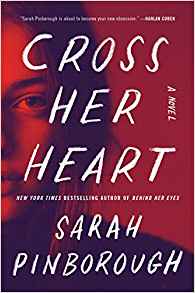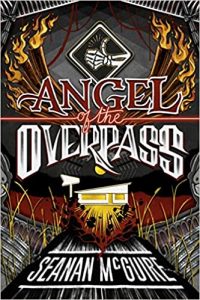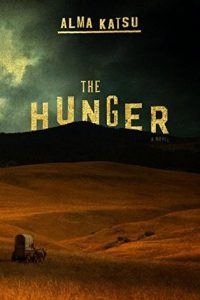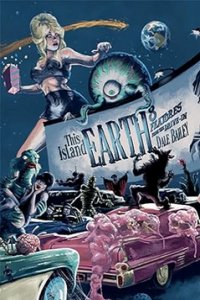John Langan Reviews Cross Her Heart by Sarah Pinborough
 Cross Her Heart, Sarah Pinborough (HarperCollins UK 978-0008132019, £12.99, 384pp, hc) May 2018. (Morrow 9780062856791 $26.99, 352pp, hc) September 2018.
Cross Her Heart, Sarah Pinborough (HarperCollins UK 978-0008132019, £12.99, 384pp, hc) May 2018. (Morrow 9780062856791 $26.99, 352pp, hc) September 2018.
As was the case with Behind Her Eyes, Sarah Pinborough’s previous bestseller, there’s a significant plot twist in Cross Her Heart, her new novel. The difference is, this crook in the narrative arrives at roughly its halfway point and is only the first of several which accelerate the plot. The result is a novel every bit as satisfying as its predecessor without being a carbon-copy of it. Indeed, the book reads like a (post)modern take on the material of one of Daphne Du Maurier’s books. This is no empty pastiche, however, but a smart updating of the Gothic form, one rooted in a tough-minded vision of female solidarity and empowerment.
After a brief, ominous section set in an undefined “After,” the Cross Her Heart moves to “Now,” which is broken up among a number of alternating first-person, present-tense narrators. Principal among them are single mother Lisa and her 16-year-old daughter, Ava. Lisa works for a small recruitment agency on the verge of landing a major client; Ava is a champion swimmer at her high school and part of a group of four close friends. Lisa is reserved, wary of everyone except for one friend at work; Ava is much more at ease in social situations, on the verge of losing her virginity with an attractive boy she has selected for the event. From the start, it’s clear that Lisa is the survivor of some variety of trauma, one whose perpetrator may have either gone unpunished or been released from prison. It’s a secret of which she has kept her daughter uninformed. At the same time, we watch Lisa attempting to move forward with her life, going out for a drink with her co-workers, accepting a dinner invitation from the head of the company with which her firm is negotiating a possible contract. Nor, we learn, is Lisa the only one in the family with secrets, as we see Ava conducting a clandestine Facebook relationship with what appears to be an older man, one that threatens to move from the virtual to the physical. Throughout this section of the novel, Pinborough expertly manipulates the reader, setting up a plot whose outlines seem to be increasingly, even glaringly visible. Then Ava performs a sudden, heroic act at a local festival, saving a small child from drowning in a river. The rescue brings her and her mother unexpected media attention, as a consequence of which, Lisa’s life collapses in a completely unexpected fashion, and the novel pivots in a startling new direction.
With this move, the narrative dilates to encompass Lisa’s past experience, which is as unrelentingly grim and brutal as anything from Ian McEwan’s early novels. A study in poverty, neglect, and abuse, her youth was redeemed by a friendship with another girl from a family of significantly better means. Their combined excesses led to a horrific crime of which Lisa was found guilty, and which brought her first to juvenile detention and then, once she was out, to an entirely new identity, provided for her by a government cautiously willing to offer her a fresh start at life. This identity also had to be abandoned, however, when she revealed her true identity to the man with whom she had had her daughter and he became dangerously unstable, erratic, drinking too much and behaving in a threatening manner. Another identity was constructed for her and her daughter, one which comes to a sudden end when the media ferrets out Lisa’s past life and the crime associated with it. She and Ava are relocated to a new safe house by the police, who are already at work on a new set of aliases for mother and daughter. Shocked and appalled by these sudden revelations about her mother, Ava has no intention of remaining with her; instead, she escapes to meet her Facebook crush and subsequently goes missing. By this point in the novel, Pinborough has given us a number of possible suspects for the role of Ava’s Facebook friend, which range from Ava’s father to one of the women at Lisa’s job. With Ava missing, the narrative enters race-against-the-clock territory, as Lisa – who is fairly sure of the kidnapper’s identity – must work out how to slip from and continue to evade police custody while searching for her daughter’s location.
It’s breathless stuff, made more so by Pinborough’s refusal to make Lisa either hopelessly hapless or overpoweringly capable. Instead, she remains a credible portrait of a person still tormented by memories of her past failings, as well as a mother determined to do what she can to find, rescue, and protect her daughter from whoever has abducted her. By its climactic scene, we’ve entered the hyper-real landscape of the Gothic thriller, of the giallo, but Pinborough’s crisp, elegant prose keeps us grounded in her characters’ immediate experience. Although it features a male character who threatens to emerge as a modern-day Mr. Darcy or Rochester, the focus here remains on women as the center of the plot and its resolution. The result is a smart, gripping novel about believable characters caught up in extreme, even extravagant circumstances. Daphne Du Maurier would be proud – and more than a little envious.
John Langan is the author of two novels, The Fisherman (2016) and House of Windows (Night Shade 2009), and two collections of stories, The Wide Carnivorous Sky and Other Monstrous Geographies (2013) and Mr. Gaunt and Other Uneasy Encounters (2008). With Paul Tremblay, he co-edited Creatures: Thirty Years of Monsters (2011). One of the founders of the Shirley Jackson Awards, he served as a juror for its first three years. He lives in New York’s Mid-Hudson Valley with his wife and younger son.
This review and more like it in the January 2019 issue of Locus.
 While you are here, please take a moment to support Locus with a one-time or recurring donation. We rely on reader donations to keep the magazine and site going, and would like to keep the site paywall free, but WE NEED YOUR FINANCIAL SUPPORT to continue quality coverage of the science fiction and fantasy field.
While you are here, please take a moment to support Locus with a one-time or recurring donation. We rely on reader donations to keep the magazine and site going, and would like to keep the site paywall free, but WE NEED YOUR FINANCIAL SUPPORT to continue quality coverage of the science fiction and fantasy field.





